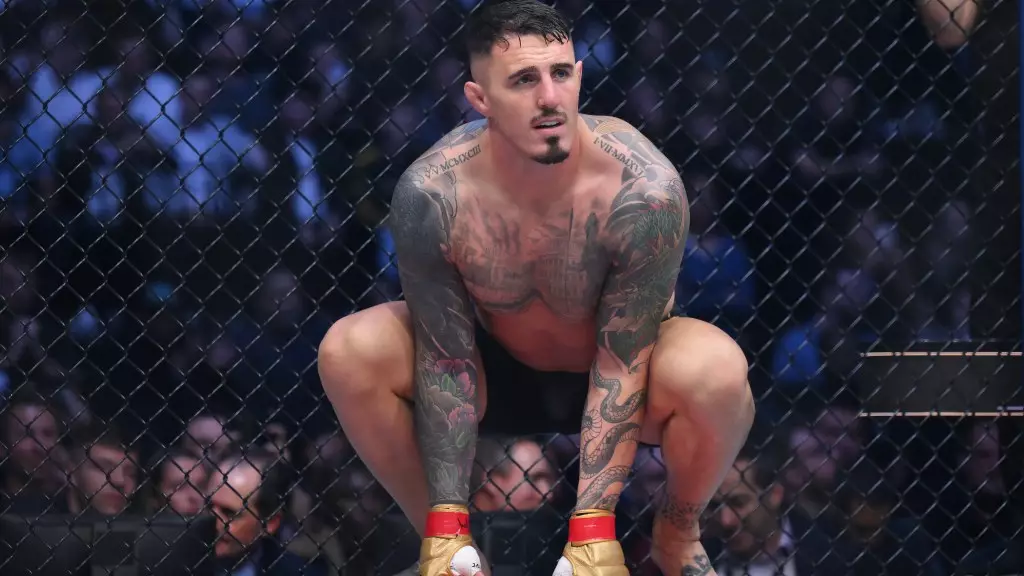In the whirlwind world of mixed martial arts (MMA), the movements of its elite fighters often captivate fans and analysts alike. Recently, UFC heavyweight champion Jon Jones and his coach, Brandon Gibson, have garnered significant attention as discussions emerge about a potential matchup against interim champion Tom Aspinall. While many fans may interpret Jones’ hesitance as avoidance, Gibson insists that their decisions stem from a deeper strategy rather than fear of competition. The dynamics of their relationship and the broader implications in the realm of MMA bring forth intriguing considerations regarding the balance between athleticism and business acumen.
For the uninitiated, Jon Jones is a name that resonates profoundly in the UFC arena. With a professional record that boasts an impressive 28 wins and a mere one loss, Jones has not only reigned supreme in the heavyweight division but has also proven his mettle in the light heavyweight category. At 37 years old, the question often arises: What more does he have to prove? Gibson believes that Jones has transcended beyond the need to validate his skills through regular bouts; it’s now about maximizing opportunities that align with both his career and personal ambitions.
Brandon Gibson emphasizes that the hesitancy to accept fights is not indicative of cowardice or a desire to evade tough competition. Instead, he argues that it is about tactical timing and robbing responsibility from unfair matchmaking scenarios. “People are not always rewarded for their efforts in this sport,” Gibson remarked during a discussion on SiriusXM Fight Nation. This statement encapsulates the hard reality of prizefighting, where financial considerations and legacy-building often dictate the trajectory of a fighter’s career.
Tom Aspinall, with a record of 15-3 and a swift rise in the UFC ranks, is emerging as a formidable contender. His prowess in the octagon cannot be understated, making the potential matchup an intriguing one. However, Gibson argues that Aspinall is just another face in a long line of challengers who have sought to dethrone Jones. Each contender poses unique challenges, yet Jones has consistently proven to be a formidable opponent, adept at adapting and overcoming hurdles presented during fights.
While some may suggest that Jones’ interest in a matchup with light heavyweight champion Alex Pereira indicates a lack of interest in facing Aspinall, Gibson clarifies that the rationale is far more complex. The notion that Jones is strategically prioritizing his matchups allows for broader implications about his career trajectory. Maintaining a focus on legacy means choosing fights that make both competitive and financial sense.
It is crucial to acknowledge the intricate balance between fighting and business in the UFC. Fighters must navigate contracts, endorsements, and fan expectations, all while grappling with the physical and emotional toll of the sport. This complexity is manifested in Jones’ current situation, where Gibson posits that the decision-making process is heavily influenced by both personal and professional factors.
“I always tell Jon, you don’t owe anybody anything,” Gibson asserted. This sentiment reinforces the control Jones has in selecting his path moving forward. As fans clamor for matchups based on rankings and popularity, the fighters themselves often weigh their options with meticulous scrutiny, considering how each fight impacts their legacy, health, and financial security.
As Jon Jones continues to navigate the elite ranks of the UFC, the decision-making framework shaped by Brandon Gibson serves as a testament to their partnership. Emphasizing strategy over sensationalism, the dynamic duo encapsulates a more prominent understanding of competitive engagement in MMA. Whether it be facing Tom Aspinall or any other challenger, the overarching theme remains clear: Jon Jones is a fighter who grasps the importance of timing and legacy while simultaneously protecting his future. As the saga unfolds, fans will have to be patient and trust the process—because in the world of MMA, intelligence and strategy often trump sheer bravado.

